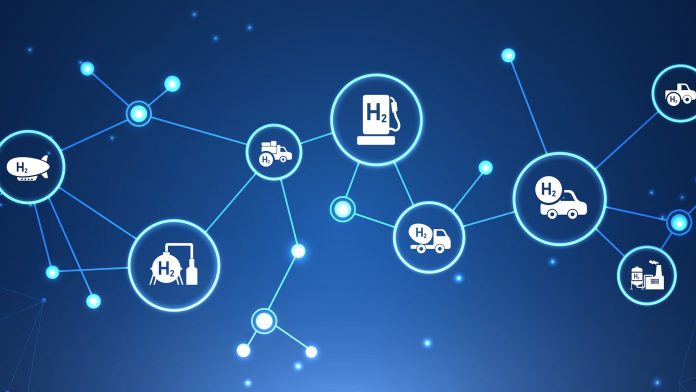Loic Hares, Energy Lead at Digital Catapult, discusses how the digitalisation of the energy system will be key to enabling the hydrogen economy of the future.
The world is at a turning point when it comes to energy generation and use. Climate change is forcing governments and corporations to make changes to their energy policies, and the push towards net-zero carbon emissions is gaining momentum.
At Digital Catapult, we are working to solve more challenges and support businesses as they look to achieve net zero by 2030, but doing so will require more wind and solar power. As the demand for renewable energy increases, however, the need for greater capabilities to effectively store and manage renewable energy increases in parity. How do we effectively solve this?
Hydrogen is a proven way to store excess energy, but before hydrogen can be used as a medium for renewable energy storage, the country’s energy system must be digitised, so that energy storage can be effectively integrated and monitored in real-time. This level of digitalisation will create the hydrogen economy of the future.
The role of hydrogen in energy storage
Hydrogen has the potential to follow a similar trajectory to offshore wind if companies figure out an economical way to produce it. The use of hydrogen for storage yields several benefits to business and industry, if utilised and leveraged correctly. For example, using hydrogen for energy storage can allow for the integration of more sources of renewable energy, including enhancing storage options and tapping their full potential.
Hydrogen energy storage provides a way to store excess energy when demand is low and allows companies to use the hydrogen for production, transport, and heating. This is particularly beneficial for renewable energy sources such as wind and solar, whereby demand can fluctuate and be unpredictable.
When renewable energy sources like wind and solar generate more electricity than the grid can handle, the excess electricity can be stored in the form of hydrogen through a regenerative hydrogen fuel cell (RHFC) system. This stored hydrogen can be later used for industrial, transportation, and heating purposes, providing a way to store energy for times when renewable sources are not generating enough. While hydrogen has a lower round-trip efficiency compared to batteries, meaning that some energy is lost in the conversion process, it can still provide a similar energy return. This is because hydrogen has a higher energy density than batteries, meaning that more energy can be stored in less space. Therefore, using hydrogen as a storage medium can provide a more cost-effective and space-efficient way to store large amounts of excess energy from renewable sources, and will therefore be key to allowing businesses and industry to effectively achieve net zero.
However, for the hydrogen economy to truly reach its potential, the UK’s energy system must be digitised. The use of emerging technologies, such as Artificial Intelligence (AI) and Machine Learning (ML), including sensors and automation, is crucial in managing the generation and storage of energy, and the real-time monitoring of the energy system is necessary for effective energy management. This aligns with the notion of the ‘Twin Transition’, which reflects the need to simultaneously transition to a low-carbon and digital economy to achieve success in the years to come.
Digitising the country’s energy system will, thus, undoubtedly play a key role in predicting the future success of UK energy, and making it more sustainable.
The importance of digitalising the energy system
At Digital Catapult, I’ve seen how the emergence of new technologies has played a significant role in the digitalisation of the energy system. One such technology is the use of AI and Internet of Things (IoT) technology, such as sensors and real-time monitoring, to manage power flows across distribution networks. With the help of these sensors, distribution network operators are transitioning to become distribution system operators (DSOs), and in doing so, they are better equipped to integrate distributed energy resources and electric vehicles into their systems. This facilitates further sustainable innovation and paves the way for the hydrogen economy of the future.
Another factor playing a critical role in the development of the hydrogen economy is the use of electrolysers to produce hydrogen from renewable energy sources. Electrolysers can help to decarbonise hard-to-abate sectors, such as steel, chemicals, and aviation; enhance energy security; and provide flexibility to balance grids. Often, electrolysers leverage emerging technologies, including AI, ML and IoT technologies, to improve efficiencies and optimise their performance. Moreover, hydrogen produced from excess renewable electricity can be stored and transported through the existing natural gas network, making it a convenient carrier of renewable energy. At Digital Catapult, we continue to leverage emerging technologies to fix market failures and solve industry challenges, including the implementation of technology to achieve net zero in the energy space. For example, our Scottish and Southern Electricity Networks Transmission project is looking to digitise the supply chain to better meet upcoming demand for renewable energy, as part of their drive to achieve their net zero targets.
By embracing digital transformation and incorporating emerging technologies such as sensors and electrolysers, organisations can make significant strides towards transforming their energy supplies for the benefit of business more broadly. The development of an integrated energy system framework that utilises multiple energy vectors and incorporates these emerging technologies can lead to cost-effective energy system decarbonisation, which is critical to achieving a low-carbon economy and reducing emissions. This will be critical to positioning the UK energy system as a leader in the field of digitalisation and the effective utilisation of hydrogen as a storage medium.
The benefits of using hydrogen as a means of moving the energy sector one step closer to achieving net zero is why Digital Catapult will be partnering with the wider Catapult network to deliver the Hydrogen Innovation Initiative. This is a national programme that will support the creation of a new hydrogen economy that will enact the transformation of UK energy more broadly, further positioning the UK as a technological and sustainable superpower.
The transition to a low-carbon energy system is well underway, and renewable energy generation is playing a crucial role in achieving net-zero carbon emissions. However, to truly achieve this goal, the energy system must be digitised, and the use of hydrogen as a storage medium must be explored. By co-locating hydrogen production and storage with renewable energy, and utilising the flexibility it provides, the energy system can become more resilient and better able to handle the challenges of the future, leading to a more resilient and sustainable energy ecosystem in the UK.
Please note, this article will also appear in the fourteenth edition of our quarterly publication.









